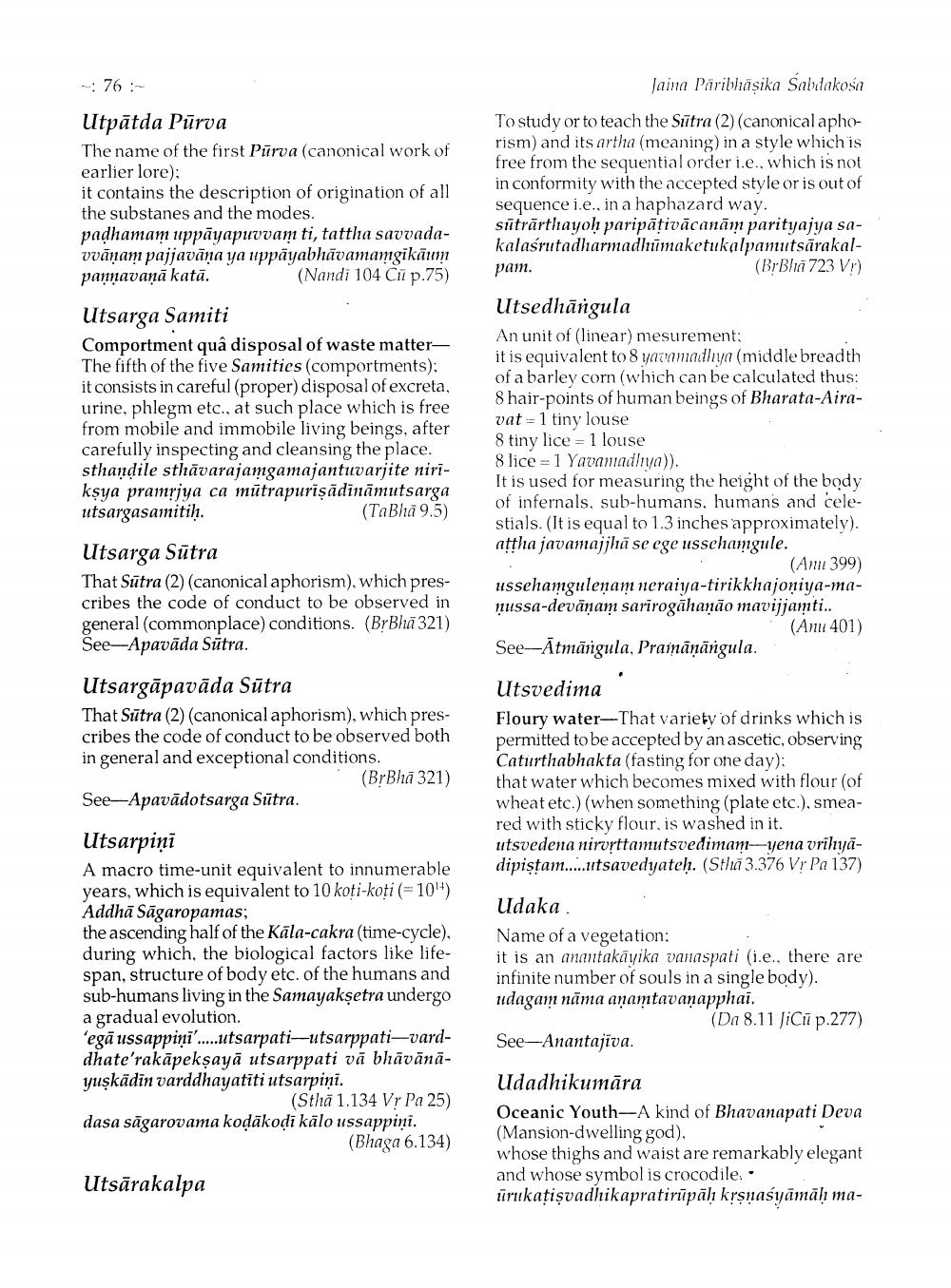________________
76:Utpātda Pūrva The name of the first Pūrva (canonical work of earlier lore): it contains the description of origination of all the substanes and the modes. padhamam uppāyapuvvam ti, tattha savvadavvānam pajjavāna ya uppāyabhāvamamgikaun pannavaņā katā.
(Nandi 104 Cū p.75)
Jaina Päribhäşika Sabdakosa To study or to teach the Sutra (2) (canonical aphorism) and its artha (meaning) in a style which is free from the sequential order i.e., which is not in conformity with the accepted style or is out of sequence i.e., in a haphazard way. sütrārthayoh paripātivācanām parityajya sakalasrutadharmadhumaketukalpamutsärakalpam.
(BrBha 723 Vr)
Utsarga Samiti Comportment quâ disposal of waste matterThe fifth of the five Samities (comportments); it consists in careful (proper) disposal of excreta, urine, phlegm etc., at such place which is free from mobile and immobile living beings, after carefully inspecting and cleansing the place. sthandile sthāvarajamgamajantuvarjite nirikşya pramrjya ca mūtrapurişādināmutsarga utsargasamitih.
(Tabha 9.5)
Utsedhāngula An unit of (linear) mesurement: it is equivalent to 8 yavamadlyn (middle breadth of a barley corn (which can be calculated thus: 8 hair-points of human beings of Bharata-Airavat=1 tiny louse 8 tiny lice - 1 louse 8 lice = 1 Yavamadhya)). It is used for measuring the height of the body of infernals, sub-humans, humans and celestials. (It is equal to 1.3 inches approximately). attha javamajjhā se ege usschamgule.
(Ann 399) ussehamgulenam neraiya-tirikkhajoniya-maņussa-devānam sarirogāhanão mavijamti..
(Anu 401) See-ātmārgula, Pramāṇāngula.
Utsarga Sūtra That Sūtra (2) (canonical aphorism), which prescribes the code of conduct to be observed in general (commonplace) conditions. (ByBhā 321) See-Apavāda Sūtra.
Utsargāpavāda Sutra That Sūtra (2) (canonical aphorism), which prescribes the code of conduct to be observed both in general and exceptional conditions.
(BrBhā 321) See-Apavādotsarga Sūtra.
Utsvedima Floury water-That variety of drinks which is permitted to be accepted by an ascetic, observing Caturthabhakta (fasting for one day): that water which becomes mixed with flour (of wheat etc.) (when something (plate etc.), smeared with sticky flour, is washed in it. utsvedena nirvrttamutsvedimam-yena vriliyadipistam...utsavedyateh. (Stha 3.376 V? Pa 137)
Utsarpiņi A macro time-unit equivalent to innumerable years, which is equivalent to 10 koti-koti (=1014) Addhā Sāgaropamas; the ascending half of the Kāla-cakra (time-cycle), during which, the biological factors like lifespan, structure of body etc. of the humans and sub-humans living in the Samayakşetra undergo a gradual evolution. 'egā ussappiņi'...utsarpati-utsarppati-varddhate'rakāpekṣayā utsarppati vā bhāvānāyuşkādin varddhayatiti utsarpiņi.
(Sthā 1.134 Vr Pa 25) dasa sāgarovama kodākodi kālo ussappiņi.
(Bhaga 6.134)
Udaka Name of a vegetation: it is an anantakāyika vanaspati (i.e., there are infinite number of souls in a single body). udagam nāma anamtavanapphai.
(Da 8.11 JiCū p.277) See-Anantajiva.
udadhikumāra Oceanic Youth-A kind of Bhavanapati Deva (Mansion-dwelling god), whose thighs and waist are remarkably elegant and whose symbol is crocodile ürukațişvadhikapratirūpālı krsnaśyāmāh ma
Utsārakalpa




